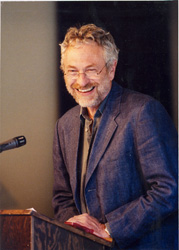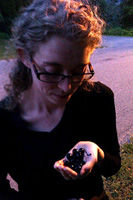Under the Publicity Spotlight:
Heike Lettrari in Conversation
with Greg Hollingshead

Malahat volunteer Heike Lettrari talks with Greg Hollingshead, one of three judges for our upcoming 2014 Novella Prize.
It’s not too late to offer a few shining words of wisdom or encouragement for writers submitting work to the Malahat’s 2014 Novella Prize, so from your experience as both a writer and an instructor of writing, are there any tips you’d recommend to those intending to submit?
Remember that you need to still love it when you send it out. If you don't, there's a good chance your reader won't. So hold out for sending out something you love and that has continued to surprise you. And don't worry about too strange. Great always seems strange at first, even to the one who made it.
Is this the first time you’re judging for a contest? Do you think it differs greatly from the kind of evaluative work you would do as a university professor or instructor? How do you feel about the prospect of team-judging with Pauline Holdstock and Ann Ireland?
I've often judged literary contests, though not always in company so fine. As with evaluation for the author's benefit, it's about, first, attending to my own aesthetic and emotional responses, and second, being as clear as I can about the judgment that comes out of them. Whether discussing a work with a class or a fellow juror or the author, it's always about being clear about what it is in the work that is having what effects for me.
As an instructor at the Banff Centre in Alberta, can you comment on how being a writing educator relates to the perspective you bring to judging? Do you think it makes you more critical, insightful, or judgmental, or something else?
Teaching writing teaches, or should teach, respect for others' visions, if only because you're so often exposed to writers with talents superior to your own. In the Writing Studio at the Banff Centre, we have a motto when it comes to hiring faculty, which we adapted from Conan Doyle and stick to: Talent recognizes genius, but mediocrity knows only itself.
Oftentimes, judges are asked to comment on the value of writing contests. I’ll ask you to do the same, but can you compare the value or experience of writing contests to submitting work to magazines through more ordinary routes? What’s the difference for you, and what are some pros and cons you’d recommend writers balance when considering the two options?
The good thing about literary contests in general is that they draw attention to the works that win; the bigger the money, the more the attention, because that's how the media think. The bad thing is that the bigger the prize, the less likelihood that the best literary book has won (not that it doesn't happen, especially when the jurors are writers). Also, the publicity spotlight narrows in on the winners, so a few books (not always good ones) sell more.
As far as I know, literary magazine contests pretty well work for everybody. The fee the non-placers have paid is rarely exhorbitant and helps the magazine. And they can go on and submit elsewhere.
On the theme of life-long learning, let’s approach that time-tested adage, “You are who you read.” Who have you been reading lately, and which authors have you been learning from that would fit on your ‘must-read’ list? Why?
Right now I'm reading Lore Segal's story collection, Shakespeare's Kitchen, because I loved her novel Her First American and thought of her again recently when she was interviewed on Writers & Co. I just finished Elisabeth de Mariaffi's How to Get Along With Women on a recommendation from Michael Crummey. I've also recently been reading Sam Lipsyte's The Ask, Thomas Pynchon's Bleeding Edge, and Josip Novakovich's April Fool's Day.
From Segal, I am learning again the beauty of focus on essentials with amusement and intelligence; in de Mariaffi, I see a new writer just beginning to discover her range; in Lipsyte and the new Pynchon, the emptiness of NYC hype; in Novakovich, a writer walking a tricky tightrope of black-comic tone and incident.
Let’s talk briefly about form: how differently do you consider long(er) and short(er) forms for fiction, or writing, generally? When you think of a novella, is there a distinct feature you want to identify other than the length? What’s important about it?
I know this will sound reductive, but a novella is usually a novel without a subplot. It tends to open up like a novel and proceed to its climax rather than, like a short story, feel built around it. But even more than a novel, and in some ways as much as a short story, the novella is friendly to expectation-defying.
Another facet of that question is: when you’re faced with two or three amazing stories, what will you look for when deciding which will win? Are you aiming to ‘objectively’ find the best story? Or does that question make you throw up your hands and say something along the lines of, “Aesthetic considerations such as those in literature are always subjective! I see my role as a judge to identify an excellent piece—and it should go without say that my preferences will inform that choice.” More generally, what do you think the role of personal preference plays regarding literary aesthetics?
Aesthetic judgments are to a certain degree subjective and emotional. But they can be informed by attention and experience. In the end it's important to choose what you love rather than, say, some "objective" idea of what other people should love. That's just an insidious form of condescenion.
You’re celebrated for the three novels and three short story collections you’ve written to date, and last year, you were awarded the Order of Canada. Eighteen Bridges mentioned that you’re working on a fourth novel. How fares that project? Are you a one-project kind of writer, or do you have more than one project on the go at the same time?
The novel was finished (twice) and then abandoned. I just couldn't get it right. And no point putting something not-right out there. I've been writing short stories again, which after that long slog with the novel is really enjoyable.

Heike Lettrari
* * * * * * * *
Read full guidelines for our 2014 Novella Prize.









